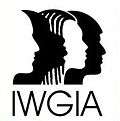International Work Group for Indigenous Affairs
The International Work Group for Indigenous Affairs (IWGIA) is an independent and non-profit international human rights-based membership organization, whose central charter is to endorse and promote the collective rights of the world's indigenous peoples.[1] Established in 1968, the IWGIA is registered as a non-profit organization in Denmark, with the head office of its secretariat based in Copenhagen. IWGIA's work is primarily funded by the Nordic Ministries of Foreign Affairs and the European Union.
 | |
| Founded | 1968 |
|---|---|
| Type | Non-governmental organization |
| Focus | Indigenous rights |
| Location | |
Area served | Worldwide |
Revenue | DKK 6.304.158 (2008) |
| Website | iwgia.org |
| Part of a series on |
| Indigenous rights |
|---|
| Rights |
| Governmental organizations |
| NGOs and political groups |
| Issues |
| Legal representation |
| Category |
IWGIA holds consultative status with the United Nations Economic and Social Council (ECOSOC) and has observer status with the Arctic Council and with the African Commission on Human and Peoples' Rights.
History
The constitution of the IWGIA as a body was first proposed and initiated in August 1968, at the 38th International Congress of Americanists, held in Munich and Stuttgart. Formed as a co-operative of academic anthropologist researchers and human rights activists, the IWGIA was initially concerned with redressing the threats posed by the rapid development of settlements and industries to the indigenous groups living in the Amazon Basin. A network for indigenous advocacy and activism was first established in Brazil and Paraguay, with the IWGIA later expanding its activities and involvement to the concerns of indigenous American peoples generally. Subsequently, the IWGIA's working groups, advocacy support and research publications extended to cover indigenous issues across all continental regions of the globe.
Since the May 28, 2000 adoption of changes to its statutes, the IWGIA has been incorporated as a membership organization, whose base membership contributes an annual subscription fee towards the running of the organization and funding of its activities.
Activities
IWGIA support indigenous peoples' organisations through its regional and thematic programmes. As of June 2012, it has three regional programmes - on Africa, Latin America and Asia - and one country programme, supporting indigenous peoples in the Russian Federation, plus a programme on climate change, supporting indigenous participation in international climate change processes and local activities and awareness raising related to national REDD+ strategies.
The Human rights programme supports the participation of indigenous peoples in international human rights mechanisms such as the United Nations Permanent Forum on Indigenous Issues
The Publications programme includes the publication of IWGIA's yearbook "The Indigenous World", as well as a variety of books, human rights reports, briefing papers, manuals and videos mostly in English and Spanish. However, IWGIA has also occasionally published in Danish, Hindi, French and other languages.
See also
References
- IWGIA - The International Work Group for Indigenous Affairs, Cultural Survival
External links
- IWGIA - Official website